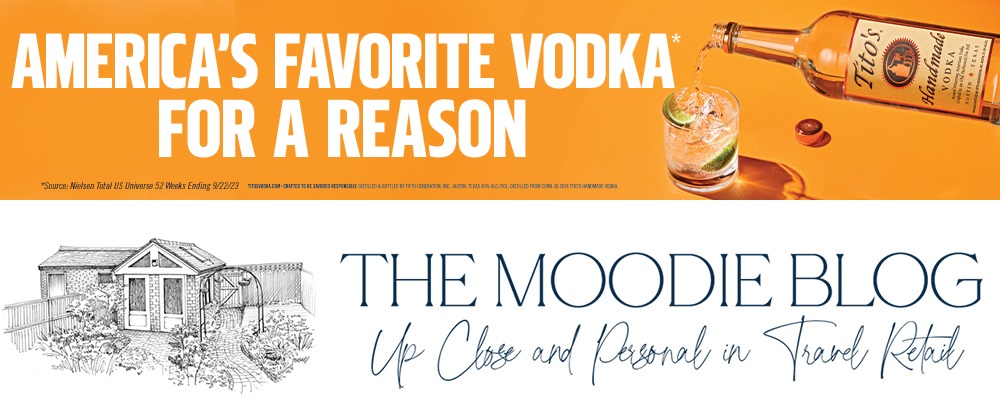Latest posts by Martin Moodie (see all)
- Back in New Zealand, Aotearoa, land of the long white cloud - March 11, 2025
- In celebration of The Moodie Davitt Report wāhine - March 8, 2025
- Celebrating Shiseido’s affirmation that age is just a number - March 1, 2025
Briefly at least, The Moodie Davitt Report found itself front page news of a mainstream media title late last month. There we were, in pride of place as lead story alongside an advertisement for a temporary cleaner at a local school and an article asking readers to watch out for Asian hornets in order to protect local bees.
The media in question was On the Wight, an excellent local online title, which had picked up on my ‘What if’ story about Boris Johnson’s government introducing Hainan-style offshore duty free to the picturesque island.
To recap, I wrote: What if the UK government, keen to kick-start a stricken domestic economy ravaged by the COVID-19 crisis, while simultaneously grappling with the complexities of Brexit, tried some out-of-the-box measures? What if it focused on efforts to simultaneously stimulate domestic consumption and domestic tourism?

What if it took a leaf out of China’s book and mirrored one of the world’s most successful attempts to boost a moribund local economy? What if it created a UK equivalent of China’s booming ‘offshore duty free’ shopping policy, unveiled in April 2011 on the island of Hainan – ‘China’s Hawaii’?
After reporting my story, journalist Sally Perry asked readers: What do you think? Is it a good idea that could happen, or just blue sky thinking?
The reader reaction was all dark sky rather than blue, predictable enough but nonetheless interesting, in the process underlining why Hainan’s economy will be one of the world’s hottest over the next decade and the UK’s (and the Isle of Wight’s) will not.
“What an utter load of tosh,” wrote an outraged reader dubbed ‘Chartman’. “Duty Free IOW – smugglers’ paradise. The island would sink with visitors, buying duty free and selling to all their mates on the mainland… just like the booze trips to Calais and the tobacco runs to Adinkerke.”
That’s right Chartman, we don’t want all those nasty visitors sinking your island and spending lots of money in bars, restaurants and accomodation while they’re there do we?
Next to leap into the fray was Colin. “Thank you for the offer but no thanks. Reasons why not? So many that there isn’t time, space or inclination to list them.”
That’s a pity as I would have liked to have heard a single good argument why not. Within days of my story riling the good citizens of the Isle of Wight, the Hainan authorities announced a tripling of the offshore duty free licence in Hainan and a widening of the categories that can be sold.
These were among the measures contained in the hugely ambitious Hainan Free Trade Port Overall Plan released by Hainan Provincial Bureau of International Economic Development, that positions the island as a regional economic powerhouse within five years.

I doubt that the Hainan authorities worried too much about the local equivalents of Chartman and Colin. They simply got on with a far-sighted programme that will stimulate the local and national economy, satisfy consumer needs and desires, and encourage domestic rather than overseas consumption.
I doubt too that the powers that be in Saipan in the 1970s paid heed to the griping of their Chartmans and Colins when DFS co-partner Anthony (Tony) Pilaro visited the local government authority, which wanted to build a US$3.25 million airport but lacked the funding.
Pilaro and fellow partners Bob Miller (co-founder and still a shareholder in DFS to this day), Chuck Feeney and Alan Parker simply funded the building of the airport and got a 20-year exclusive duty free lease in return. That investment was paid back within a year and Saipan had a tourist economy (and a DFS presence) that has powered it ever since.






On the Isle of Wight, alas, I feel that Chartman and Colin will win the day and that this delightful little island will continue to tick over at the same rate as the sloth-like British economy for years to come. Another local media, IslandEcho.com reports that the tourism and hospitality sector generates half a billion pounds annually and is responsible for 16% of employment. The Isle of Wight welcomes 2.4 million visitors each year who spend £303 million (US$380 million), it noted.

I’m pretty confident that my cheekily created Dufry Isle of Wight Offshore Duty Free store (below), paying a healthy rent (variable of course) to the local authorities, could add a whole lot to both those numbers. Oh well, I will just have to take my proposal to the good citizens of nearby Portsea Island instead.



You must be logged in to post a comment.